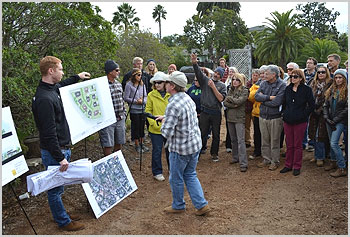|
Proposed
Leucadia subdivision triggers another debate over density
law
By
Jared Whitlock, December 12,
2013
| |
 |
| |
Residents
voice concerns during a workshop for a proposed 10-home
development on Fulvia Street in Leucadia, arguing it
would cause flooding and hurt community character. CityMark
Development representatives say the subdivision would
blend in the with the neighborhood and have proper drainage.
The project spurred another debate over the state’s
“density bonus” law. Photo by Jared Whitlock
|
ENCINITAS
— Residents are concerned about a proposed housing development
on Fulvia Street in Leucadia. At the center of the debate:
state legislation.
City
zoning allows a maximum of five homes on the 2.16-acre parcel.
But CityMark Development would like to use California’s
“density bonus” law to build a total of 10 homes
there.
State
law gives developers permission to build extra housing if
they set aside units for low-income residents. In the case
of the Fulvia development, one of the 10 units would be dedicated
to a low-income family.
Around
40 people came out to the property on Dec. 7 for a community
workshop to discuss the project. Standing on a dirt lot on
the largely undeveloped plot, residents told CityMark representatives
that 10 homes is just too many for the site.
“People
are here because of the density,” resident Denise Martin
said.
She
later added that developers underestimated the “tenacity”
of locals during the campaign for Proposition A — the
growth-control initiative that took effect this summer.
“If
we can pass Prop A, we can certainly challenge you,”
she said.
Residents
believe increasing the density to 10 homes would upset the
neighborhood’s character and cause flooding issues for
the surrounding streets.
In
response, Russ Haley, vice president of CityMark, said the
company would sit down with residents to explain how the drainage
plans are designed to prevent flooding. Based on feedback,
CityMark is open to amending drainage and other architecture
plans, he noted. However, as it stands, he said those behind
the project are unwilling to negotiate over the number of
homes.
“As
far as the density issue, and I know that’s why everybody’s
here, I realize you guys want five (homes),” Haley said.
“But in order for it to work with us, we’re going
to go in and proceed with 10.”
He
later said CityMark would work hard to make the development
blend in with the rest of the community.
CityMark
is in escrow with the property, but the purchase is contingent
on the project getting approval from the city. Haley declined
to state the sale price.
The
city is currently reviewing CityMark’s project plans,
according to Roy Sapau, senior planner with Encinitas. Staff
members will then look at whether the development could have
a significant impact on the environment.
If
significant, CityMark will have to complete an environmental
impact report.
On
average, each home would go on a 9,600-square-foot lot. There
would be seven two-story homes, a single-story home and two
homes that are largely one story, but with “two-story
elements,” Sapau said. Because it’s early in the
process, Sapau said there’s no timeline for when the
project will go before the city’s Planning Commission.
Resident
Susan Turney said that many locals will fight the project
because it could pave the way for more density-bonus projects
in Encinitas.
“This
is much bigger to all of Encinitas than just this plot,”
Turney said.
Encinitas
is no stranger to controversy over density-bonus housing.
Earlier this year, the City Council approved the Desert Rose
development despite Olivenhain residents voicing heavy opposition.
In
turn, residents from a group called Save Desert Rose filed
a lawsuit against the city. The case likely won’t be
heard until next March, said Everett Delano, a lawyer representing
Save Desert Rose.
Delano
noted cities couldn’t deny density bonus projects solely
on the basis of the extra units allowed by the state. To turn
down, local governments have to find evidence that the development
would have a negative impact on public health and safety.
Councilwoman
Lisa Shaffer acknowledged continuing “frustration”
over density bonus projects among residents.
She
said council members will discuss potential options for making
density bonus less attractive for developers during a city
planning session next year.
The
discussion will likely cover why Encinitas seems to receive
a high number of density bonus applications compared to other
cities, Shaffer said.
“We
want to talk with other jurisdictions to see if they’re
doing some differently,” Shaffer said.
She
said density bonus law has good intentions, but doesn’t
always make sense in practice.
“There
are some areas where it makes sense, and other areas where
it really doesn’t,” Shaffer said.
top
|











